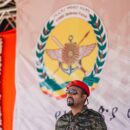American Democracy and African Liberation
 The ideals of American democracy, and the spirit of African liberation, have been intimately linked for more than half a century. At pivotal historic moments the two have intersected. In the 1950s, inspired by Mahatma Gandhi, Kwame Nkrumah was a proponent of non-violent “positive action” and he and his fellow African nationalists saw their cause as inextricably linked to the efforts for emancipation in the U.S.
The ideals of American democracy, and the spirit of African liberation, have been intimately linked for more than half a century. At pivotal historic moments the two have intersected. In the 1950s, inspired by Mahatma Gandhi, Kwame Nkrumah was a proponent of non-violent “positive action” and he and his fellow African nationalists saw their cause as inextricably linked to the efforts for emancipation in the U.S.
The veteran American civil rights activist Bill Sutherland has described how Martin Luther King and his wife Coretta “were visibly impressed when, on that fateful night in 1957, the British flag was lowered, and the flag of Ghana was raised. Nkrumah, dressed in traditional kente cloth, his fists waving in the air, tears streaming down his face, shouted over and over again, ‘Free at last! Free at last!'” King used those same words himself at his famous speech at the Lincoln Memorial, attributing them to a Negro spiritual. Sutherland wonders whether, perhaps, “those thunderous words in Washington DC had not come from King’s memory of that historic evening in Ghana.”
Tragically, by the time of King’s triumph, Nkrumah had been deposed and humiliated. The mountain he had set himself to climb was too steep, and his enemies were too many. Perhaps most fatefully, Nkrumah’s embrace of violence as the means of liberation””albeit under extreme duress””scarred the previously civic and peaceable tradition of Africa’s emancipation. The addiction to armed struggle and the coup d’état disfigured the African left for a long generation and also estranged African liberation from its erstwhile broad base of sympathy in America.
Nelson Mandela was the inspiring exception, for both Africans and Americans. In May 1994, President-elect Mandela spoke at the African National Congress’s victory celebration. He wrote later, “Mrs Coretta Scott-King … was on the podium that night, and I looked over to her as I made reference to her husband’s immortal words. ‘This is one of the most important moments in the life of our country. I stand before you filled with deep pride and joy – pride in the ordinary, humble people of this country. You have shown such a calm, patient determination to reclaim this country as your own, and now the joy that we can loudly proclaim from the rooftops – Free at last! Free at last!'”
Mandela’s triumph was the last echo of the civic tradition of African independence struggle, achieved””against the odds””peaceably in the continent’s most fractured country. During those long years in which African liberation had lost its way, swamped in repeated disappointment, Mandela was an icon of principled resistance and hope””not just to South Africans, but to Africans and Americans too.
On a balmy November night just ten weeks ago, Senator Barack Obama made only passing reference to the civil rights struggle and never mentioned his own identity save as an American. He did not need to. The picture of an African American family on the podium, about to enter the White House, said it all. Across America, the night of November 4/5 was a liberation day, celebrated with astonishing euphoria. A peaceful revolution. African Americans walked inches taller. In Harvard Square””not, admittedly, characteristic of the U.S.””where I joined the revelry with my wife and small son, there was total jubilation. Among the Obama stickers was a Kenyan flag.
Today outside the Capitol, as President Barack Hussein Obama stumbled through the oath of office””an uncharacteristic verbal infelicity in someone so skilled in oratory””the dream came true. Again, Obama made only glancing reference to the village in which his father was born and his own racial identity, and again, he did not need to do so. More telling was his insistence in his inaugural address that American principles and American power were one and the same, that the country would once again lead the world. Perhaps most telling of all was the ceremony itself and the seamless way in which the entire apparatus of government transferred from loyalty to the outgoing President George W. Bush””symbol of American militaristic hegemonic ambitions””to President Barack H. Obama, who symbolizes so many opposite ideals.
There’s no doubt that Obama’s victory restores the world’s””and America’s””faith in American democracy and the American promise of equality and boundless possibility. There’s no question that this resonates particularly deeply in Africa, where young people cannot fail to draw the contrast between what has just happened in America, and their own leaders who possess a less-than-total commitment to democracy and human rights. Whatever policies the Obama Administration pursues towards Africa, the simple fact that he has been elected and taken office transforms America’s standing. The gracious concession speech by John McCain on that fateful November night should also be studied by African leaders. America’s political system has shown itself more principled and robust than many could have imagined. It challenges Africa’s leaders to take democracy and human rights with the commensurate seriousness.
An earlier version of this posting was published in “Making Sense of Darfur” on November 5.





